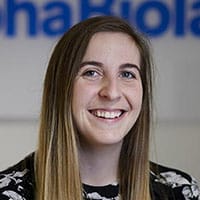Common questions about understanding your paternity test results.
What are DNA STR markers?
Short tandem repeat (STR) markers are specific locations on a chromosome made up of sequences of repeated DNA. The STR markers that AlphaBiolabs examines are highly variable in length between individuals. Each individual has two copies of each STR marker, known as alleles: one is inherited from the father and the other from the mother.
Which DNA STR markers are examined?
AlphaBiolabs tests up to 45 DNA markers including two sex-specific markers as standard. These are:
DNA markers D3S1358, vWA, D1S1358, D16S539, CSF1PO, TPOX, D8S1179, D21S11, D18S51, Penta E, D2S441, D19S433, TH01, FGA, D22S1045, D5S818, D13S317, D7S820, D6S1043, D10S1248, D1S1656, D12S391, D2S1338, D7S1517, D3S1744, D2S1360, D6S474, D4S2366, D8S1132, D5S2500, D21S2055, D10S2325, SE33 and Penta D.
Two sex markers: Amelogenin and Yindel (Y chromosome specific) Differences between the X chromosome and Y chromosome versions of the amelogenin gene (AMELX and AMELY, respectively) enable it to be used in sex determination.
How does the DNA paternity test work?
The two alleles observed at each STR marker are compared between the tested individuals. A full match of these alleles between individuals provides evidence of a relationship between them. Each allele is represented by two numbers. For example, if a father displays numbers 13 and 17.3 for one specific genetic marker, the child will need to display either the 13 or the 17.3 on the same genetic marker to show it has been inherited from the father. There will need to be a match with all the STR markers tested for an inclusion of paternity (A).

| STR marker | Mother | Child | Possible father | |||
| D3S1358 | 11 | 17 | 11 | 14 | 8 | 14 |
| vWA | 16 | 16 | 15 | 16 | 15 | 15 |
| D16S539 | 14 | 15 | 15 | 17.3 | 13 | 17.3 |
| CSF1PO | 10 | 10 | 10 | 10 | 10 | 10 |
| TPOX | 13 | 14 | 14 | 14 | 14 | 16 |
| AMEL | X | X | X | X | X | Y |
In example A, you can see that the child’s DNA footprint is made up from half the mother and half the father. In example B below, you can see that the potential father does not share a marker with the child and is therefore excluded from paternity (i.e., he cannot be the father).

| STR marker | Mother | Child | Possible father | |||
| D3S1358 | 11 | 17 | 11 | 14 | 8 | 14 |
| vWA | 16 | 16 | 15 | 16 | 15 | 15 |
| D16S539 | 14 | 15 | 15 | 17.3 | 13 | 17.3 |
| CSF1PO | 10 | 10 | 10 | 10 | 10 | 10 |
| TPOX | 13 | 14 | 14 | 14 | 14 | 16 |
| AMEL | X | X | X | X | X | Y |
What is the probability of paternity?
A Laboratory testing relies on the statistical probability of the alleged father being the child’s biological father and not any other man from the same ethnic group who may share a similar DNA profile by random chance.
What is the combined paternity index?
The probability of relationship is calculated by comparing the DNA profiles obtained to an untested random individual within the general population. When the probability of paternity is 99.99% for example, this means that the tested man is 99.99% more likely to be the biological father than another man chosen at random from the same ethnic group. The combined paternity index is a calculation that helps us arrive at the probability of paternity.
Could the result be incorrect?
- AlphaBiolabs tests all exclusion results twice so you can be confident of getting an accurate result.
- Most illnesses will not affect the DNA result.
- All tests are performed assuming that a close male relative of the alleged father is not the potential father. If this is not the case, it is recommended that any such relative is also tested as the result provided may be invalid. This information should be provided at the time of testing so that it can be taken into consideration when analysing your results.
Still have questions? Lots more information can be found on the Learning Centre pages of our website:
 0140 29466
0140 29466 info@alphabiolabs.ie
info@alphabiolabs.ie 0 Items
0 Items



